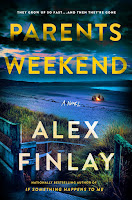With a hurricane bearing down on Galveston, Charlie Book gives his team the night off. They've been stationed offshore with the Texas Parks and Wildlife Service, studying the Christabel—a half-sunken 19th-century freighter swallowed by Gulf waters and tangled in a lattice of mangrove trees. Over time, nature has turned the wreck into something strange and beautiful, a ghost ship wrapped in living roots. Book has grown obsessed with the vessel’s eerie stillness, isolation, and secrets. He plans to ride out the storm alone aboard the ship, despite the warnings.
Just as he’s about to depart, Ruby appears on the dock. He hasn’t seen her in years. Their relationship ended in pain, the kind you don’t easily talk about or forget. Now here she is, soaked in rain and panic, not alone but with a frightened woman and an infant in tow. They beg him to take them aboard the Christabel. They're running from a coven of witches, no less, and believe the child is marked for sacrifice. Book knows it sounds insane. He almost laughs. But something in Ruby’s eyes makes him pause. Against his better judgment, he agrees to help.
As the storm closes in and the wind howls through Christabel's broken ribs, something stirs in the dark. The night birds are circling, watching, waiting. What seemed like an act of mercy may have just invited an ancient terror aboard.
I'll admit, the setup of The Night Birds struck me as a bit over-the-top when I first read the synopsis. A coven of witches chasing a woman with the intent to sacrifice an infant? It sounded more pulpy than genuinely terrifying. And yes, there are certainly moments in this story that invite an eye-roll or two. But Christopher Golden is a master of horror for a reason, and that expertise is on full display here.
Golden conjures a setting that’s as eerie as it is beautiful—a half-drowned ship tangled in mangrove roots, isolated off the Texas coast. It’s the kind of place that keeps you off balance, unsure whether to marvel or shudder. The forest-aquatic atmosphere alone generates a steady undercurrent of unease, and when Golden decides to go for the scares, he delivers. Several moments in this novel had me reaching for the nearest light switch.
Is The Night Birds my favorite of his? No. That title still belongs to The House of Last Resort. But it’s always a thrill to dive into horror that’s atmospheric, original, and unapologetically weird. The Night Birds might be a little silly, but it’s also a creepy, fast-paced blast. And really, what more could you ask for?
For more information, visit the author's website, Amazon, and Goodreads.
(2025, 35)








